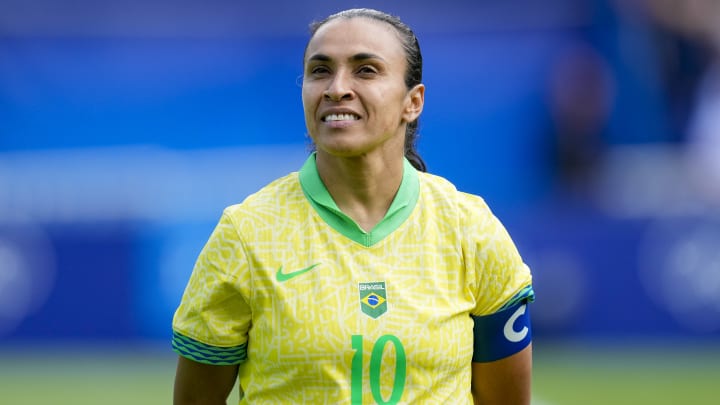The Stage Is Set for a Fitting Farewell to Brazilian Great Marta

An emotional Marta, wearing her signature red lipstick and sunny yellow Brazil kit, with sweat slicking back her hair, took a deep breath before looking directly at the camera. Her team had just been booted from the 2019 Women’s World Cup, but Marta had loftier things on her mind, and this post-match interview was now her bully pulpit.
"It's wanting more. It's training more. It's taking care of yourself more. It's being ready to play 90 plus 30 minutes. This is what I ask of the girls. There's not going to be a Formiga forever. There is not going to be a Marta forever,” she said, beginning to point down the barrel.
“The women's game depends on you to survive. So think about that. Value it more. Cry in the beginning so you can smile in the end."
"Cry in the beginning so you can smile in the end"
— FOX Soccer (@FOXSoccer) June 23, 2019
Marta's message for Brazil's next generation will give you CHILLS. 💛💚 pic.twitter.com/waDAFlgM4F
Five years later, the same generation Marta pleaded with to carry the torch has now lifted her, and Brazil, to a gold-medal match against the United States at the Paris Olympics. Brazil did so largely without its superstar on the pitch, but rather as a motivating presence on the sidelines. After receiving a red card and a two-game suspension for a foul committed in Brazil’s group-stage loss to Spain, Marta’s finale was mired in uncertainty. In April, the 38-year-old had announced her plan to retire from international soccer at the end of the year, making her sixth Olympic appearance her last. Needing to advance to the medal rounds in order to see Marta take the pitch again in Paris, Brazil fought past tournament hosts France and reigning World Cup champions Spain in its two knockout matches. In doing so, Brazil guaranteed itself a place on the Olympic podium and secured a fitting stage for its icon’s farewell.
It will be the team’s first Olympic final appearance since consecutive appearances in 2004 and ’08, when Brazil took home silver medals after falling to the U.S. in both fixtures. Marta, of course, was there for those matches. She is the only player (by a long shot) competing in Saturday’s Parisienne rematch who was present for that instant classic, extra-time thriller in Beijing. She was also there in ’07 in China, when Brazil thumped the U.S., 4–0, in the World Cup semifinals, with Marta scoring a brace. And the two nations’ quarterfinal epic at the 2011 World Cup? Marta was there too. Despite her scoring a brace in that match, the U.S. managed to pull out a win on penalty kicks—thanks to the late-game heroics from Megan Rapinoe and Abby Wambach.
In the available videos from some of those moments, especially in Marta’s earliest major tournaments, one must contend with a grainy haze now synonymous with the technology of the early aughts to make her out. Longevity, while remarkable, isn’t Marta’s most notable accomplishment though. She hasn’t just seen a lot in her nearly 20-year intentional career—Marta’s done a lot, transforming the sport. With 17 goals, Marta is the top World Cup goalscorer (men’s or women’s) of all time. A stat worthy of her GOAT status.
But no quantifiable figure, no matter how jaw-dropping, can truly capture the tour de force that is Marta. Little debate surrounds who is the best women’s player to grace the pitch—it’s Marta. She’s your favorite player’s favorite player. A footballer’s footballer.
“Marta’s just the greatest player, I think, that’s ever played in our game,” Rapinoe said ahead of the 2023 SheBelieves Cup final.
This is a sentiment so unanimously shared that it often goes without saying. On the field, Marta appears to dance on the ball as she weaves through swarming defenders. She’ll disorient opponents, flicking a ball overheard or nutmegging those who dare get too close. Her playing style can resemble a game of cat and mouse, luring a defender in only to expose, and frankly, embarrass them. That notorious flare mixed with her vision, finishing ability and technical supremacy makes Marta a once-in-a-generation footballing talent one must behold to fully appreciate. She’s been likened to Pelé, even nicknamed “Pelé in Skirts”, a moniker the 82-year-old Brazilian icon co-signs. Meant as high praise no doubt, the designation is imprecise. Marta is a phenomenon all her own.
Her mentality has come to define an era of soccer. As exquisite as Marta can look between the touchlines, she also carries herself with an apparent grit. She’s intense, dogged and wields a competitive edge. Perhaps that tenacity stems from her teenage years, when she boarded a bus at just 14, leaving behind her family and traveling over 1,000 miles to Rio de Janeiro to play soccer. The giant of women’s football hails from Dois Riachos, a small municipality with a population of just 11,000, and one that, at the time, had few opportunities for a girl to pursue her footballing dreams. Now, those on Brazil’s national team and players across the country, look to emulate Marta’s mental toughness and staying power.
“My generation, we did not have female players to look up to, so now to have players like her, especially with what she achieved and who she became, it’s very important,” Brazilian soccer star and 1999 Women’s World Cup Golden Boot winner Sissi told CNN in 2023. “You already saw how much the game changed in Brazil. Now, people can say: ‘I want to be like Marta.’ ”
Legacy has been a concern of Marta’s for some time, but not necessarily her own. When she said, “There is not going to be a Marta forever,” she wasn’t worried about her legend, but rather the health of her successors. She wants to leave Brazilian women’s football (and by extension, the sport) in a better place than when she found it. And it is. How could it not be?
But on Saturday in Paris, Marta also has the chance to etch an entry into her own biography by doing something she’s yet to do in her career: win a major tournament outside of South America. Knowing Marta and this Brazilian side, they will be ruthless in that pursuit. But once the final whistle blows, no matter the result, an all-time great will exit a stage she helped build. One can only hope she’ll heed her own words: “Cry in the beginning so you can smile in the end."
